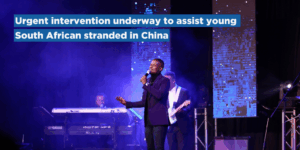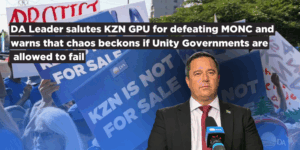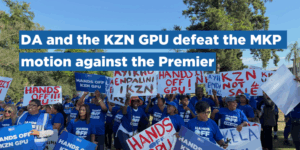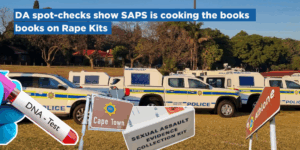Outgunned, outmanned, outnumbered, outplanned. When he wrote these lyrics for the musical Hamilton, Lin-Manuel Miranda could have been describing the state of South Africa’s security system in the week after 9 July when members of the ANC’s radical economic transformation faction unleashed their plan to shut down KZN.
SAPS failed utterly to protect people and property. Police presence was almost non-existent in the first few days. Citizens were left to fend for themselves or watch property and jobs go up in flame. When resources were finally mustered, there were not enough officers, not enough leadership, not enough equipment and not enough coordination.
Our security services either didn’t know or didn’t care.
The people of South Africa have a right to know what went wrong and who is responsible for this catastrophic failure of intelligence. It comes down to three simple questions: Who knew about it? When did they know? What did they do about it?
Did police minister Bheki Cele receive intelligence reports as claimed by state security minister Ayanda Dlodlo and denied by him? If so, when did he receive them and what did he do about it? Did President Ramaphosa and Defence Minister Nosiviwe Mapisa-Nqakula receive the reports? If so, when, and what did they do about it?
When he addressed the nation a week later, on Friday 16 July, President Ramaphosa called it “a deliberate, coordinated attack on our democracy”. What evidence led him to that conclusion? Why did Mapisa-Nqakula directly contradict him?We need to know.
The DA has requested a copy of these alleged intelligence reports, in accordance with the Promotion of Access to Information Act (PAIA). We believe they should be released to the public. The Presidency is reluctant to share them, claiming secrecy to be in the public interest.
But in fact it is very much in the public interest to know the answers to these fundamental questions. One can understand the need for secrecy before a potential attack on the country. But this insurrection has happened, and the damage is done. We need to stop it happening again. That means holding accountable those elected officials mandated to protect the nation, arresting the instigators, and fixing the state security services.
The only people whose interests secrecy now serves is those trying to dodge accountability. And this is the only logical explanation for their refusal to publish the reports.
Undue secrecy that stifles oversight and accountability was one of the main problems with the State Security Agency identified by Dr Sydney Mufamadi’s High Level Panel in their 2018 report. Very little is known, even by parliamentarians and the Auditor General, about how the R4 billion plus SSA budget is spent. Unsurprising then, that the report claims the SSA has become a “cash cow” for many inside and outside the agency.
Another central problem identified by the panel is politicisation and ANC factionalism within the intelligence community – an inevitable result of cadre deployment of political cronies rather than appointment of independent professionals into the public service.
Almost three weeks later, with over 300 lives and R50 billion lost, 150 000 jobs at risk, 40 000 business affected, 139 schools damaged, a million rounds of ammunition stolen, and investor confidence shattered, not a single high-profile person has been arrested for instigating the insurrection. Most likely, this is because some of those tasked to identify the instigators are themselves instigators. There can be no doubt that the SSA is still packed with RET supporters.
The SSA was created in October 2009 just six months after Zuma became president and was swiftly repurposed into a political weapon, a VIP protection unit, and cash cow for him and others, as exposed in detail by Jacques Pauw’s in his book, My President’s Keepers. Yet nothing has been done with this evidence.
The Mufamadi report recommended a complete overhaul of the agency to enable the building of a professional intelligence capability. Yet President Ramaphosa failed to implement the report’s recommendations, and only called for a commission after the full scale of the abuse was exposed at the Zondo Commission earlier this year.
I have for years called in vain for specialised, rigorous oversight of the country’s intelligence services. Nothing has been done, for example, about the complaint I lodged against Arthur Fraser with the Inspector General of Intelligence.
We need to radically overhaul not just the spy services themselves but how oversight is done. The intelligence minister must account to Parliament. The opposition needs to see audited financial statements and budgets, as well as intelligence reports. This is international best practice. Even the CIA and FBI report in open committee in congress.
It is completely unconstitutional and unacceptable that the SSA serves some in the party, rather than all in the country. Ramaphosa’s obsession with ANC unity has prevented him taking the action necessary to clean up the spy services, starting with appointing new leadership that is professional and committed to the constitutional mandate of protecting the country.
His long game is becoming an endgame for South Africa, with less and less left to save. ANC unity is the problem, not the solution. His failure to professionalise the intelligence agency ultimately constitutes as much of an attack on our constitutional order as the insurrection itself. In fact, the insurrection is a symptom of this failure.
The DA stands ready to support Ramaphosa and give him the majority he needs in Parliament to fix our intelligence service and its oversight and rid it of Zuma acolytes once and for all.




